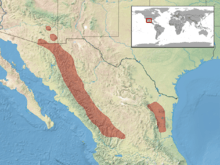Crotalus pricei
| Crotalus pricei | |
|---|---|
 | |
| Scientific classification | |
| Kingdom: | Animalia |
| Phylum: | Chordata |
| Subphylum: | Vertebrata |
| Class: | Reptilia |
| Order: | Squamata |
| Suborder: | Serpentes |
| Family: | Viperidae |
| Subfamily: | Crotalinae |
| Genus: | Crotalus |
| Species: | C. pricei |
| Binomial name | |
| Crotalus pricei Van Denburgh, 1895 | |
 | |
| Synonyms | |
| |
Crotalus pricei is a venomous pit viper species found in the United States and Mexico. Currently, two subspecies are recognized, including the nominate subspecies described here.[4]
Etymology
The specific name, pricei, is in honor of William Wightman "Billy" Price, a field biologist, who collected the first specimens which became the type series.[5]
Description
Adults usually do not exceed 50–60 cm (about 20-24 in) in length. The maximum length recorded is 66 cm (26 in).[2]
The color pattern consists of a gray, bluish-gray, brownish-gray, or medium- to reddish-brown ground color, usually with a fine brown speckling. This is overlaid with a series of dorsal blotches that tend to be divided down the median line to form 39-64 pairs.[2]
Common names
Its common names are twin-spotted rattlesnake,[2] western twin-spotted rattlesnake,[3] Price's rattlesnake, Arizona spotted rattlesnake, spotted rattlesnake,[6] and Arizona twin-spotted rattlesnake.[7]
Geographic range
This snake is found in the United States in southeastern Arizona. In northern Mexico, it occurs in the Sierra Madre Occidental in Sonora, Chihuahua, and Durango. It has also been found in the Sierra Madre Oriental in southeastern Coahuila, Nuevo León, and Tamaulipas, with isolated records in San Luis Potosí and Aguascalientes. The type locality given is "Huachua Mts., Arizona" (Cochise County, Arizona, USA).[1]
Conservation status
This species is classified as Least Concern on the IUCN Red List of Threatened Species (v3.1, 2001).[8] Species are listed as such due to their wide distribution, presumed large population, or because they are unlikely to be declining fast enough to qualify for listing in a more threatened category. The population trend was stable when assessed in 2007.[9]
Subspecies
| Subspecies[4] | Taxon author[4] | Common name[3] | Geographic range[1] |
|---|---|---|---|
| C. p. miquihuanus | Gloyd, 1940 | Eastern twin-spotted rattlesnake | Mexico: southeastern Coahuila, Nuevo León and Tamaulipas |
| C. p. pricei | Van Denburgh, 1895 | Western twin-spotted rattlesnake | United States: southeastern Arizona, Mexico: Sonora, Chihuahua and Durango |
See also
- List of crotaline species and subspecies
- Crotalus by common name
- Crotalus by taxonomic synonyms
- Crotalinae by common name
- Crotalinae by taxonomic synonyms
- Snakebite
References
- 1 2 3 McDiarmid RW, Campbell JA, Touré T. 1999. Snake Species of the World: A Taxonomic and Geographic Reference, vol. 1. Herpetologists' League. 511 pp. ISBN 1-893777-00-6 (series). ISBN 1-893777-01-4 (volume).
- 1 2 3 4 Campbell JA, Lamar WW. 2004. The Venomous Reptiles of the Western Hemisphere. Comstock Publishing Associates, Ithaca and London. 870 pp. 1500 plates. ISBN 0-8014-4141-2.
- 1 2 3 Klauber LM. 1997. Rattlesnakes: Their Habitats, Life Histories, and Influence on Mankind. Second Edition. First published in 1956, 1972. University of California Press, Berkeley. ISBN 0-520-21056-5.
- 1 2 3 "Crotalus pricei". Integrated Taxonomic Information System. Retrieved 1 August 2007.
- ↑ Moll, Edward O. 2003. Patronyms of the Pioneer West, V. Crotalus pricei, Van Denburgh, 1895 – Twin-spotted rattlesnake. Sonoran Herpetologist 16(12):110-112.
- ↑ Wright AH, Wright AA. 1957. Handbook of Snakes of the United States and Canada. (7th printing, 1985). Comstock Publishing Associates. Ithaca and London. 1105 pp. ISBN 0-8014-0463-0.
- ↑ Brown JH. 1973. Toxicology and Pharmacology of Venoms from Poisonous Snakes. Springfield, Illinois: Charles C. Thomas. 184 pp. LCCCN 73-229. ISBN 0-398-02808-7.
- ↑ Crotalus pricei at the IUCN Red List. Accessed 13 September 2007.
- ↑ 2001 Categories & Criteria (version 3.1) at the IUCN Red List. Accessed 13 September 2007.
Further reading
- Van Denburgh, J. 1895. Description of a new rattlesnake (Crotalus pricei) from Arizona. Proc. California Acad. Sci., Series 2, 5: 856-857.
External links
| Wikimedia Commons has media related to Crotalus pricei. |
- Crotalus pricei at the Reptarium.cz Reptile Database. Accessed 12 December 2007.
